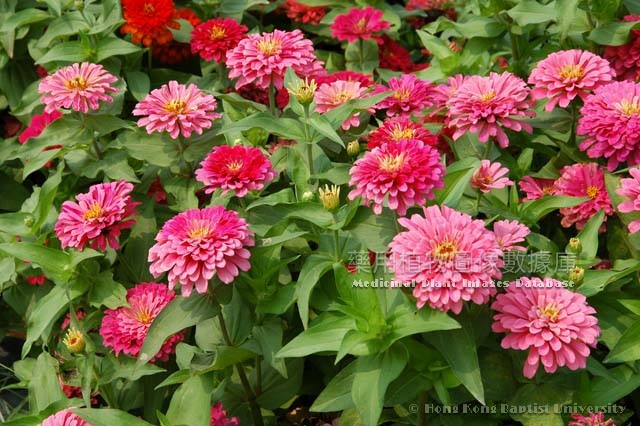|
Zinnia elegans Jacq.

|
English Name |
Common Zinnia, Youth-and-oldage |
|
Latin name |
Zinnia elegans Jacq. |
|
Family & Genus |
Asteraceae, Zinnia |
|
Description |
Annual herbs, 30-100cm high. Stem upright, covered with rough fur or long hard fur. Leaves opposite, broad orbicular ovate or long round oval, 5-10cm long, 2.5cm wide, full edge, no stalk, basal part embraces stem in a slightly heart shape, two surfaces rough, lower surface covered with short rough fur, 3 veins generate from basal part; periclinium broad campanulate shaped, luxuriant piece multilayer, broad oval or oval shaped; leaf attached on the upper end of stipular, purplish red, purl like triangular; ligulate flower deep red, rose or white, tongue piece invert orbicular ovate, 2-3 tine crack tips in the anterior end or full edge; tubular flower yellow or orange, 7-8mm long. Female flower achene invert orbicularovate, 6-7mm long, 4-5mm wide, flat, an arris in the middle of venter and both sides respectively; tubular flower achene invert oval wedge-shaped, 7-8mm long, 3.4-5mm wide, extremely flat. Flowering: June to September; fruiting: July to October. |
|
Distribution |
Originating in Mexico. Now cultivated in all parts of China, sometimes found wild. |
|
Part Used |
Medical part: whole plant. Chinese name: Bairicao. |
|
Harvest & Processing |
Harvested in spring and summer, used fresh or chopped into segments, and sun-dried. |
|
Chemistry |
Leaves contain haageanolide. Flowers contain flavonoid glycosides, like kaempferol-3-O-β-D-glucoside and quercetin-3-O-β-D-glucoside, etc. |
|
Properties & Actions |
Bitter, pungent, cool.Clearing heat, disinhibiting dampness and detoxifying. |
|
Indications & Usage |
Hygropyretic dysentery, stranguria, mammary abscess, furuncles.Oral administration: decocting, 15-30g. External application: appropriate amount, fresh products smashed for applying. |
|
Examples |
Dysentery: common zinnia 30g, pork 90g. Steam and swallow. |
|
Permanent URL:https://sys01.lib.hkbu.edu.hk/cmed/mpid/detail.php?herb_id=D00707 |
|
|

